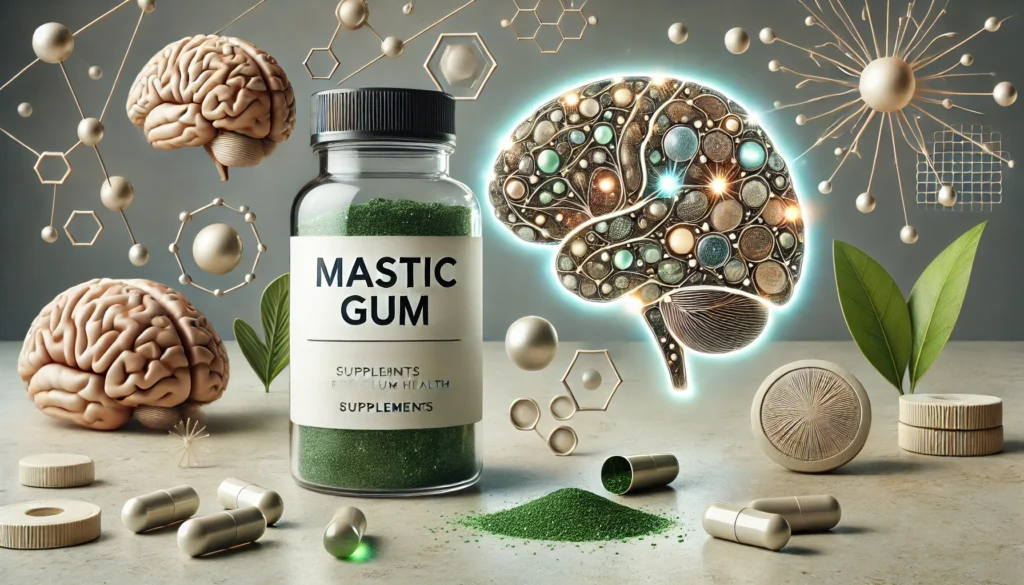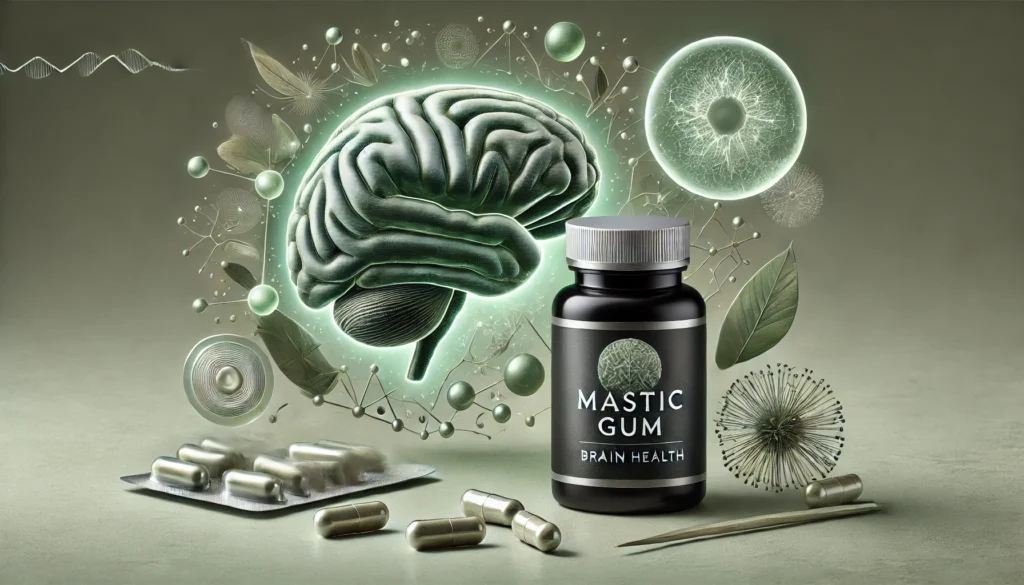Mastic, a resin obtained from the mastic tree (Pistacia lentiscus), has been used for centuries in traditional medicine for its wide range of therapeutic properties. Native to the Mediterranean region, particularly the island of Chios in Greece, mastic is revered for its ability to promote digestive health, support oral hygiene, and provide anti-inflammatory effects. Recently, mastic has gained attention in the realm of nootropic supplements due to its potential cognitive-enhancing benefits. This article delves into the chemistry, physiological mechanisms, potential nootropic effects, recommended dosages, and side effects of mastic, while also addressing its interactions with other drugs and supplements.
You May Also Like:
Sources of Mastic
Mastic is derived from the resin of the Pistacia lentiscus tree, a small evergreen shrub that thrives in the Mediterranean region. The resin is harvested by making incisions in the bark of the tree, from which the sap exudes and hardens into small, translucent, amber-colored tears. These resinous droplets are collected and processed for use in various forms, including powder, capsules, and tinctures, for both medicinal and culinary purposes.
Historically, mastic has been used for digestive issues, oral care, and as an antimicrobial agent. In modern times, it has garnered interest as a potential nootropic supplement, particularly due to its antioxidant and anti-inflammatory properties, which may benefit cognitive health.

Chemistry of Mastic
The active compounds in mastic are primarily derived from the resin itself, which contains several bioactive molecules with pharmacological properties. Key chemical constituents include:
- Triterpenoids: Mastic resin contains a variety of triterpenoids, which are naturally occurring compounds known for their anti-inflammatory and antioxidant effects. The most notable triterpenoids in mastic are masticadienonic acid and oleanolic acid, both of which have been shown to possess neuroprotective properties.
- Phenolic Compounds: Mastic also contains phenolic compounds, such as flavonoids and tannins, which are well-known for their antioxidant properties. These compounds help neutralize free radicals, reducing oxidative stress that can contribute to brain aging and neurodegenerative diseases.
- Essential Oils: The resin of mastic contains volatile oils that are responsible for its distinctive aroma and many of its antimicrobial properties. These oils contribute to mastic’s therapeutic effects, including its ability to support digestive and oral health.
These compounds interact synergistically to provide mastic with its health benefits, particularly as an anti-inflammatory, antioxidant, and neuroprotective agent.
Physiological Mechanisms of Mastic in the Body and Brain
The mechanisms of action of mastic on the body and brain are complex, but they primarily involve its effects on inflammation, oxidative stress, and neuroprotection. Below are the main physiological pathways through which mastic may impact cognitive function:
1. Anti-inflammatory Effects
Inflammation is a central factor in many cognitive disorders, including Alzheimer’s disease, Parkinson’s disease, and other neurodegenerative conditions. Chronic inflammation in the brain (neuroinflammation) can impair neuronal function, leading to cognitive decline. Mastic’s triterpenoid content, particularly masticadienonic acid, has been shown to possess anti-inflammatory properties by inhibiting pro-inflammatory cytokines and modulating the activity of inflammatory enzymes like COX-2. By reducing inflammation, mastic may help protect neural tissues and support brain health.
2. Antioxidant Activity
Mastic contains powerful antioxidant compounds, such as flavonoids and phenolic acids, which protect the brain from oxidative stress. The brain is particularly vulnerable to oxidative damage due to its high metabolic rate and oxygen consumption. Reactive oxygen species (ROS) can damage brain cells and contribute to neurodegeneration, a process thought to be involved in aging and cognitive decline. By neutralizing these free radicals, mastic may help preserve neuronal function and prevent damage associated with aging and cognitive diseases.
3. Neuroprotection
Beyond its anti-inflammatory and antioxidant properties, mastic has neuroprotective effects that may support cognitive function. Research suggests that mastic’s active compounds help protect neurons from toxic damage by reducing oxidative stress and inflammation. Additionally, mastic has been shown to promote neuronal regeneration, which may be beneficial in conditions where neuronal damage has occurred. By supporting brain health at the cellular level, mastic may help enhance cognitive function and delay the onset of cognitive impairments.

Nootropic Benefits of Mastic
Mastic’s potential as a nootropic supplement stems from its ability to modulate brain health through various mechanisms. Below are some of the key nootropic benefits associated with mastic supplementation:
1. Enhanced Cognitive Function
Given its neuroprotective, anti-inflammatory, and antioxidant properties, mastic may help improve overall cognitive function. By protecting the brain from oxidative damage and reducing inflammation, mastic supports the integrity of neural networks that are essential for memory, learning, and concentration. Regular supplementation with mastic may help maintain cognitive clarity and support mental sharpness, especially in aging individuals or those experiencing cognitive decline.
2. Memory and Learning Enhancement
Mastic may improve memory retention and learning capabilities, particularly in individuals experiencing cognitive impairment due to oxidative stress or neuroinflammation. Research on the effects of mastic in animal models suggests that the resin’s active compounds can improve spatial memory and overall cognitive performance. While human studies are still limited, preliminary evidence indicates that mastic could be a promising supplement for memory enhancement.
3. Stress Reduction and Mood Support
Mastic has mild anxiolytic (anti-anxiety) properties that may help reduce mental stress and promote relaxation. By modulating inflammatory pathways in the brain, mastic may have a calming effect on the central nervous system, reducing feelings of anxiety and promoting mental well-being. This effect may be particularly beneficial for individuals dealing with chronic stress, which can impair cognitive function and memory.
4. Neuroprotective Effects in Neurodegenerative Diseases
There is growing interest in the role of mastic as a neuroprotective agent in the context of neurodegenerative diseases such as Alzheimer’s and Parkinson’s disease. Due to its anti-inflammatory and antioxidant properties, mastic may slow the progression of these conditions by protecting neurons from the harmful effects of oxidative stress and inflammation. While research is still in the early stages, mastic’s potential as an adjunctive treatment for neurodegenerative diseases is an exciting area of study.

Dosage and Supplementation Guidelines
When considering mastic as a nootropic supplement, it is important to follow appropriate dosage guidelines. The therapeutic dose of mastic can vary depending on the individual and the intended purpose (e.g., cognitive enhancement, stress reduction, digestive support). Based on current research and anecdotal evidence, here are some general recommendations for mastic supplementation:
General Nootropic Dosage
- Capsules/Tablets: The typical dosage for mastic resin supplements ranges from 500 mg to 1,000 mg per day, taken in divided doses. This dosage is believed to provide the necessary concentration of active compounds to support brain health and cognitive function.
- Powdered Resin: For individuals using raw mastic resin in powder form, a common dosage is 1-2 grams per day. The resin can be mixed with water or added to smoothies or other beverages.
Forms of Supplementation
Mastic is available in several forms, including capsules, tablets, tinctures, and powders. When choosing a mastic supplement, it is important to consider the concentration of active compounds, such as masticadienonic acid and other triterpenoids, to ensure potency and efficacy.
Side Effects and Safety
Mastic is generally considered safe when taken at recommended dosages, with few reported side effects. However, there are some considerations to keep in mind:
- Gastrointestinal Discomfort: Some individuals may experience mild gastrointestinal issues, such as bloating, gas, or indigestion, particularly when taking high doses of mastic resin. If this occurs, reducing the dosage or discontinuing use may alleviate these symptoms.
- Allergic Reactions: As with any natural supplement, some individuals may have an allergy to mastic or its constituent compounds. Symptoms of an allergic reaction may include rash, swelling, or difficulty breathing. If any of these symptoms occur, discontinue use and seek medical attention.
- Drug Interactions: Mastic may interact with certain medications, particularly those that affect inflammation or blood clotting. It is advisable to consult a healthcare provider before using mastic alongside blood thinners, such as aspirin or warfarin, or nonsteroidal anti-inflammatory drugs (NSAIDs).

Interactions with Other Supplements and Medications
Mastic may interact with other drugs and supplements, so it is important to be mindful of potential interactions:
- Anti-inflammatory Drugs: Because mastic has anti-inflammatory properties, combining it with other anti-inflammatory medications (e.g., NSAIDs, corticosteroids) could enhance their effects, potentially leading to an increased risk of side effects such as gastrointestinal bleeding or ulcers.
- Blood Thinners: Mastic’s mild anticoagulant properties may interact with blood thinners, increasing the risk of bleeding. Individuals on blood-thinning medications should exercise caution and consult with their healthcare provider before adding mastic to their regimen.
- Other Nootropics: Mastic may be combined with other nootropic supplements, such as Bacopa Monnieri or Rhodiola Rosea, to provide a synergistic effect on cognitive function and stress reduction. However, it is recommended to start with a lower dose when combining mastic with other nootropics to assess tolerance.
Risks for Individuals with Certain Health Conditions
While mastic is generally safe, individuals with certain health conditions should consult a healthcare
provider before using it as a supplement:
- Allergic Sensitivities: People with allergies to tree resins, especially those with sensitivities to other types of pine or pistachio tree sap, may be at risk of an allergic reaction to mastic.
- Gastrointestinal Issues: Individuals with digestive conditions such as ulcers, gastritis, or irritable bowel syndrome (IBS) should exercise caution when using mastic, as it may exacerbate symptoms in sensitive individuals.
Conclusion: Should You Consider Mastic as a Nootropic?
Mastic shows promise as a nootropic supplement due to its anti-inflammatory, antioxidant, and neuroprotective properties. While research on its cognitive-enhancing effects is still in its early stages, its potential to support brain health, enhance memory, and protect against neurodegeneration makes it an intriguing supplement for those seeking cognitive improvement. However, like any supplement, it is essential to use mastic responsibly and consult a healthcare provider before starting supplementation, especially for individuals with pre-existing health conditions or who are taking medications.

References:
- What is mastic gum and how does it work? Retrieved from:https://www.medicalnewstoday.com/articles/mastic-gum
- What Is Mastic Gum and How Is It Used? Retrieved from: https://www.healthline.com/health/mastic-gum
- Mastic – Uses, Side Effects, and More. Retrieve from: https://www.webmd.com/vitamins/ai/ingredientmono-565/mastic
- Mastic Gum: How Does It Benefit Gut Health? Retrieved from: https://www.verywellhealth.com/mastic-gum-benefits-8549490
- Chios gum mastic: A review of its biological activities. Retrieved from: https://pubmed.ncbi.nlm.nih.gov/22414110/
- Topical treatment with mastic (resin from Pistacia lentiscus) elicits anti-inflammatory and anti-pruritic responses by modulating keratinocyte activation in a mouse model of allergic dermatitis. Retrieved from: https://pubmed.ncbi.nlm.nih.gov/34332283/
Important Note: The information contained in this article is for general informational purposes only, and should not be construed as health or medical advice, nor is it intended to diagnose, prevent, treat, or cure any disease or health condition. Before embarking on any diet, fitness regimen, or program of nutritional supplementation, it is advisable to consult your healthcare professional in order to determine its safety and probable efficacy in terms of your individual state of health.
Regarding Nutritional Supplements Or Other Non-Prescription Health Products: If any nutritional supplements or other non-prescription health products are mentioned in the foregoing article, any claims or statements made about them have not been evaluated by the U.S. Food and Drug Administration, and such nutritional supplements or other health products are not intended to diagnose, treat, cure, or prevent any disease.


